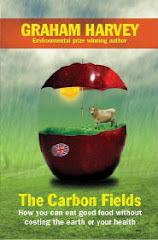Those of us who produce and market local food – or, like me, simply enjoy consuming it – don’t need reminding that it’s often a healthier way to eat. Now at last it seems the government is finally catching up with the benefits.
Health minister Ben Bradshaw has told the Commons that patients in west country hospitals showed faster recovery rates when offered locally-produced meat, dairy products, fish and vegetables than those given the usual anonymous hospital food. The comments are based on findings in Cornwall where health trusts have made big efforts to cut food miles and support local farmers and growers.
According to Ben Bradshaw no less than 80 per cent of the food served in Cornwall’s hospitals now comes from local farmers, butchers, milk producers and fishermen. Not only was local food proving popular with patients, he told the Commons, but it had actually hastened recovery rates.
Let’s hope other government departments take note of the findings. If fresh, local produce can improve the health of people in hospital, it can bring benefits to the wider community too. Institutions like hospitals, schools and prisons are only the starting point. What this obese and sickly nation needs is a totally new food system based on well-grown, nutrient-rich produce.
Sad to see that National Farmers’ Union president Peter Kendall is still pushing for an expansion of large-scale, commodity food. At the union’s AGM he spoke of Britain’s “moral duty” to make “our optimum contribution to global supplies of food and bio-energy”. What this means is that big arable farmers should be free to profit from ever higher production of low-grade industrial crops for global markets. The main beneficiaries of such a policy would be chemical companies and commodity traders. The victims would include the people of Britain, small farmers, the world’s poor and the global environment.
I agree with the NFU president that Britain has a moral duty to use its farmland wisely. But as I see it the wisest thing Britain’s farmers could do for the world is concentrate on growing healthy foods for the 60 million or so people of these islands. And they need to do it using methods that safeguard soil fertility and the global environment for future generations. This way farmers will once again become national heroes. And, like the hospital patients of Cornwall, we’ll all be a lot fitter.


1 comment:
Brilliant to see a politician, the health minister no less (and our own MP from Exeter) on the uptake.
I don't suppose you have any idea about what the report is called? I'm a member of Low Carbon Exeter sub-group dealing with food issues and this kind of information is dynamite for helping us to promote local food - especially with the local organisations we're aiming at working with. Many thanks, Rob Burns
Post a Comment